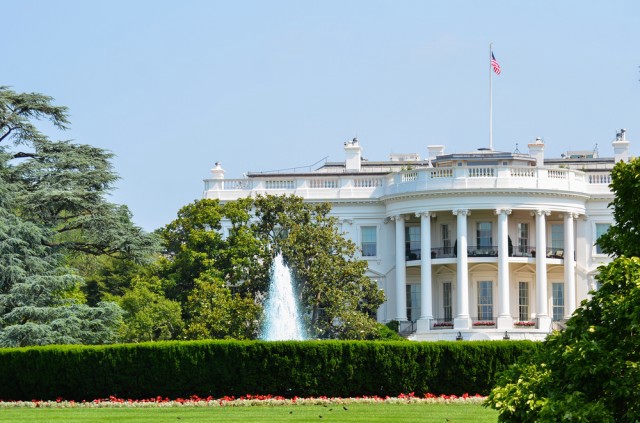Why I Donated to a Political Action Committee
by Shane Ferro

Not too long ago, I found myself plunking down a good amount of cash — roughly what I spend on groceries for a month — to attend a political fundraiser. At first, I felt almost dirty considering it, but in the end, I decided to do it because it was a cause that is important to me. Being a young journalist, I don’t make a ton of money, especially not when Manhattan rent is factored in. But I stretched myself thin to support a cause that I care about.
Recently, politics has started to affect me. I paid rapt attention to the Supreme Court decision on healthcare reform, because if it was struck down, I would find myself suddenly without insurance — a place I hadn’t planned on being for at least two more years, when I hit the ripe age of 26. This worried me because I race bikes in my spare time. While I constantly assure my friends and family it’s perfectly safe to go zooming around tight corners in a pack of 40 women at 20+ miles per hour, accidents do happen. The occasional emergency room visit is not entirely out of the realm of possibility. Even beyond emergency care, in the last six months, my insurance has saved me about 20 times my political donation in physical therapy bills due to recurring knee problems brought on by a decade and a half serious athleticism.
I had to ask myself: How much was I willing to spend to support the candidates that support me? I found a political action committee I liked, and I wrote a check (just kidding — I used my credit card, and got bonus airline miles, so I can afford to visit my parents and thank them for keeping me on their insurance plan).
Why a PAC? PACs have a terrible reputation for flooding elections with disgusting amounts of money, particularly in the wake of the 2010 Citizens United Supreme Court decision, which held that corporations, unions, and individuals could spend unlimited funds on political advertisements via so-called “Super PACs.” That said, PACs and Super PACs are now a part of the political landscape, and its hard to get anywhere in this country’s political system without them. They have already poured millions into the 2012 campaign, and short of a constitutional amendment, it is hard to see them going away anytime soon. But there are plenty of PACs out there that support worthy causes, and if you want your money to support lesbian candidates and issues, or Catholic issues, or Cats for a Better Tomorrow, Tomorrow then a PAC is the way to go.
The problem — with PACs and politics more generally — is not that people give money to causes they support. The problem is that a very, very small number of people give a very, very large amount of money to the candidates and organizations they support. According to a recent article by Harvard Law professor Lawrence Lessig in the Atlantic, only a tiny fraction of the population, .26 percent, give more than $200 to a congressional campaign. More than $10,000 is contributed by .01 percent, and less than 200 citizens (.000063 percent) have given more than three-quarters of the super PAC money that is flowing through the 2012 election cycle. These people aren’t the middle class, and they, with some notable exceptions, don’t have the interests of the middle class in mind when they fund campaigns (it’s generally more like how not to pay taxes).
So what would it take for many average people to match these uber-donors? Well, let’s say roughly 200 Americans shelled out $10 million each (as casino tycoon Sheldon Adelson did last month to a pro-Romney super PAC) — that’s $2 billion pumped into the campaign system. And let’s say the average person making the median income (around $40,000 per year) can comfortably afford about a $100 contribution (that’s maybe a weekend’s worth of bar tabs?). How many $100 contributions would you need to equal the $2 billion of the .000063 percent? Twenty million. Okay, that sounds like a lot, but in reality is less than ten percent of the population. If even one in ten people donated a healthy but affordable sum, they would match the multi-million-dollar contributions of the wealthiest donors.
But, if super PACs are what is wrong with the political campaign system, why donate to the system that keeps it going? Unfortunately, without spending the money to put candidates in office who support reform, there will never be any reform. The system can only change if someone — or a lot of someones — spends ridiculous amounts of cash to push money out of politics (Jonathan Soros is trying). Like it or not, it’s a capitalist system, and that’s the capitalist way.
Our generation has proven that we will go hundreds of thousands of dollars into debt for an education, which is supposed to be our key to the future. So why will we not spend a couple hundred dollars to support the candidates who do the most for us, and are dedicated to eventually reforming of our democratic system — the key to our country’s future*?
*Who those candidates/causes are is up to you.
Shane Ferro can only hope that her political opinions will one day be widely read and universally loathed. In the meantime, she is an art market editor at ARTINFO. She tweets and tumbls about art, bikes, economics, and wine. Photo: Shutterstock/Orhan Cam
Support The Billfold
The Billfold continues to exist thanks to support from our readers. Help us continue to do our work by making a monthly pledge on Patreon or a one-time-only contribution through PayPal.
Comments